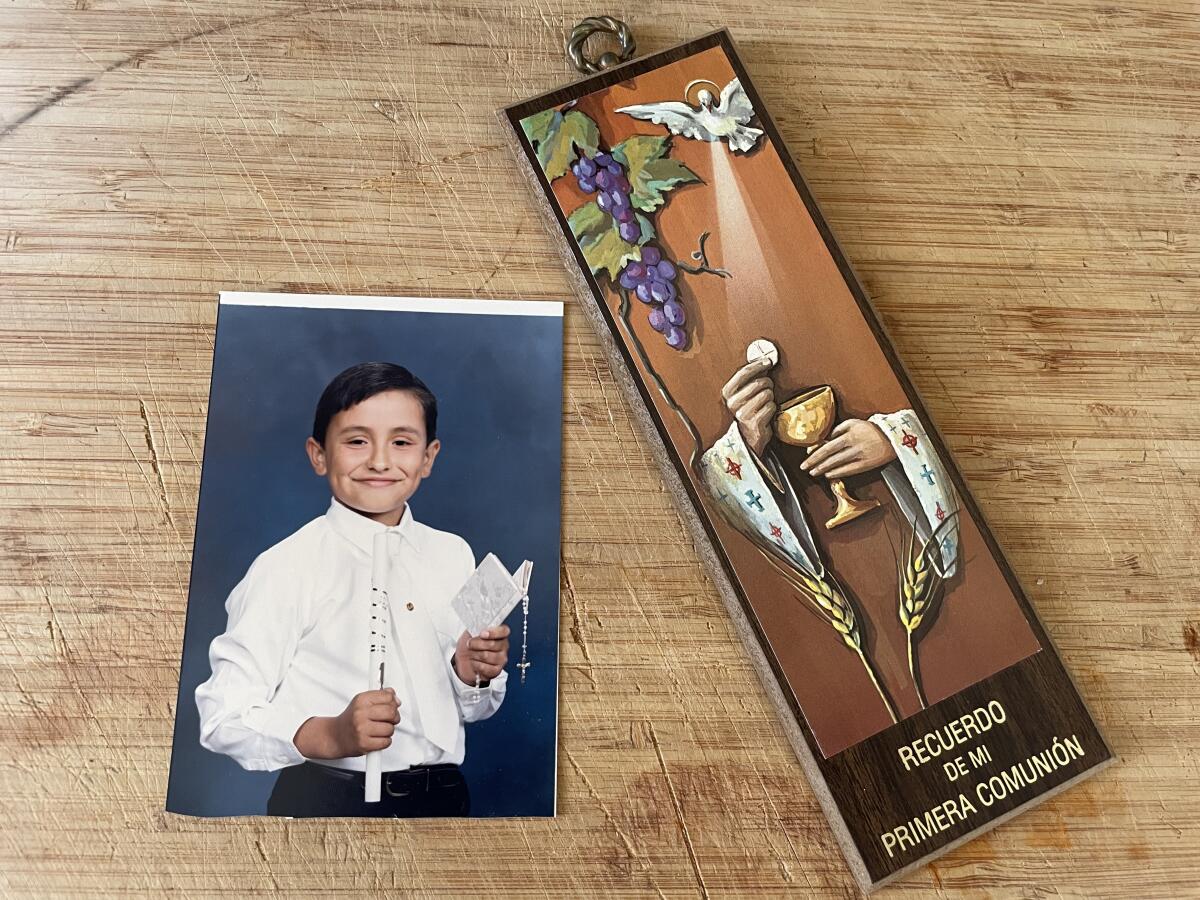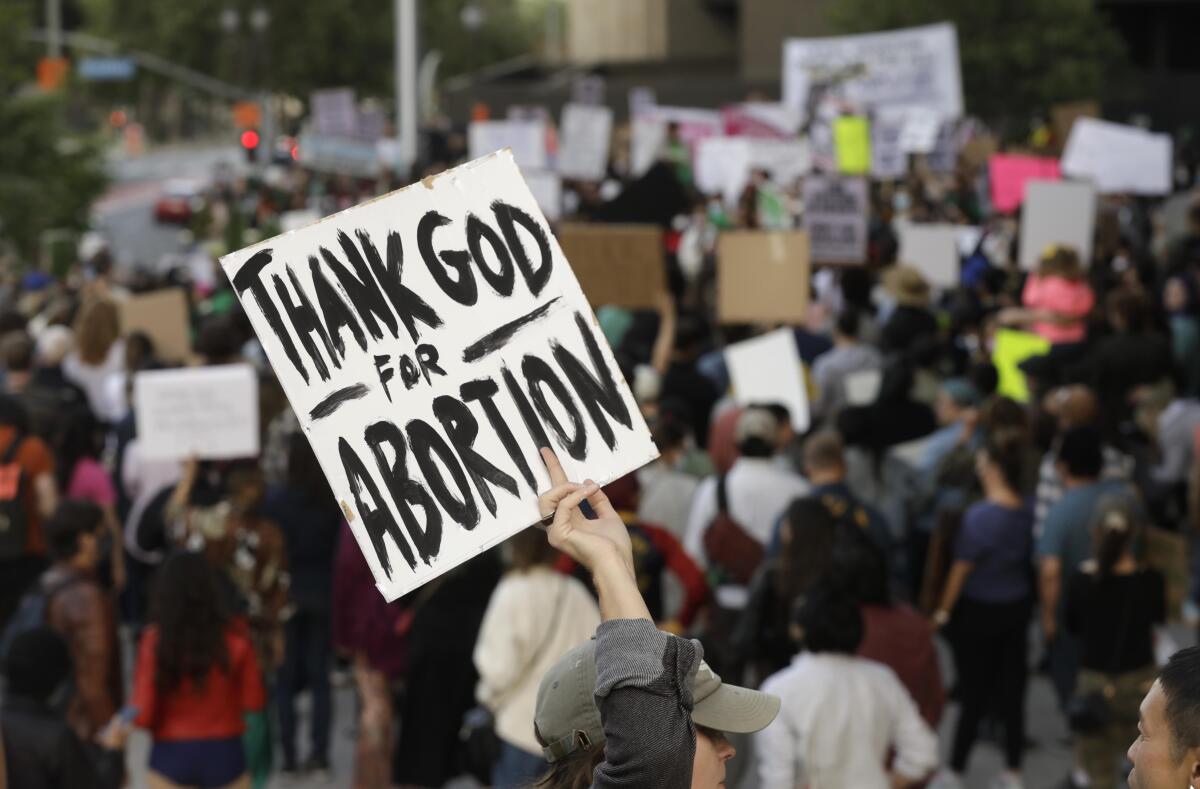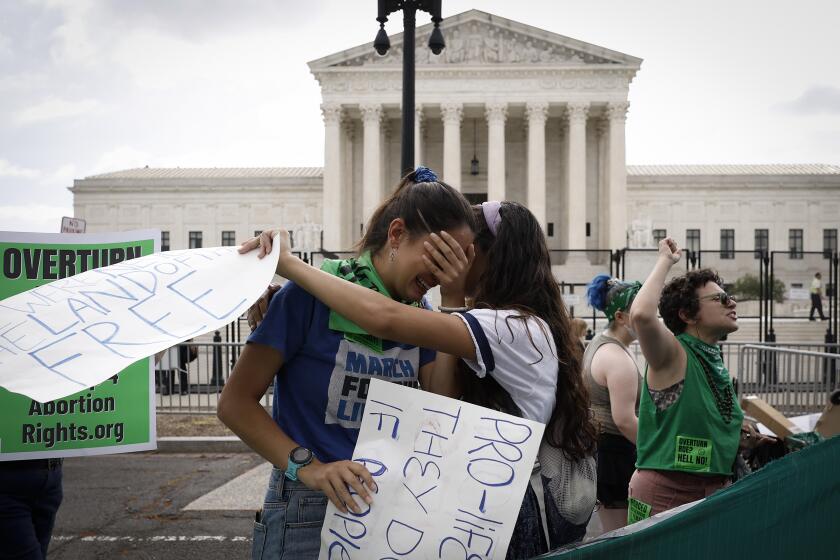Column: I’m a Catholic kid who supports abortion rights — thanks to my church’s catechism class

- Share via
In the spring of 1997, my sister and I took catechism classes at our home parish, St. Boniface Catholic Church in Anaheim.
Once a week, we joined about 20 other teens in the basement of the massive church to hear lectures on morality, Catholic principles and how to model our coming adulthood on the ways of Jesus Christ.
I learned about the evils of the Armenian genocide, about the importance of telling the truth at all times. And one afternoon, the topic was abortion.
Our instructors stressed that the procedure was a moral sin unacceptable under any circumstance — even rape, incest or to protect the health of the mother. The sanctity of life, they preached, was something we Catholics had to uphold at all times.
Then, the lights dimmed. We were going to see a film.
The documentary began with a closeup of a woman’s vagina, her legs strapped into stirrups. You couldn’t see her face or the face of the doctor whose hands came into the frame holding forceps and a cutting tool as he inserted them into the woman’s womb.
Blood gushed forth like a river. The doctor scraped and pulled and stabbed. Finally, a dead fetus tumbled out. Opening credits rolled. The church basement was silent.
In a historic reversal, the Supreme Court strikes down a half-century of nationwide abortion rights in the U.S.
This was my introduction to the abortion debate.
The documentary went on for at least half an hour. There was no narration, no context — just clip after clip of graphic footage that finally concluded with a dismembered fetus, the camera cutting closer and closer until everyone was staring into its lifeless face. At that point, most of my classmates were in tears.
I was angry.
I had grown up thinking that abortion was immoral, that anyone who had one would burn in hell. But I immediately saw the film for what it was: propaganda.
Our elders had taught us about other moral issues, but abortion was what they put the most effort into, the only topic that required a full class and a movie.
There was no debate, no nuance. The teachers just wanted to shock us into complacency so we would hate abortion and its practitioners forevermore. But it didn’t work on me.
The short film and my subsequent anger have stayed with me all these decades later. It’s what I’m especially thinking about in the wake of the U.S. Supreme Court’s ruling overturning Roe vs. Wade and the constitutional protection for abortion.
Four of the justices in the majority — Clarence Thomas, Samuel A. Alito Jr., Amy Coney Barrett and Brett M. Kavanaugh — are Catholic, while Neil M. Gorsuch was raised in the faith. Sonia Sotomayor, a Catholic, voted with the court’s other two liberals to keep Roe vs. Wade.
The court’s remaining Catholic, Chief Justice John G. Roberts Jr., wrote a concurring opinion upholding the Mississippi abortion ban in question but lamenting the overturning of Roe as “a serious jolt to the legal system.”
It’s the majority justices whose religion abortion rights activists will blame and whom antiabortion believers will hail as their moral compass.
For a faithful Catholic, there is no way around what our church teaches about abortion. The Catechism of the Catholic Church, which is the official doctrine of the Vatican, calls for the excommunication of anyone who has one, since it maintains that life begins at conception. Pope Francis, whom many conservative Catholics loathe for his supposedly leftist leanings, does allow for priests to forgive anyone who has received an abortion but still calls it “murder” and decries it as part of a “throwaway culture” that plagues the modern world.
Los Angeles Archbishop José H. Gomez, in his role as president of the U.S. Conference of Catholic Bishops, co-authored a statement praising the downfall of Roe vs. Wade and applauding abortion opponents for “their work for the cause of life [that] reflects all that is good in our democracy.”
And yet so much of what has passed for Catholicism in the United States since the days of my catechism reflects the very throwaway culture that Pope Francis decries.

As a rookie reporter in the 2000s whose first big scoops were about the Catholic Church sex abuse scandal, I sighed at how quickly bishops dismissed the accounts of people molested by priests, even though secret church records proved that the abuse happened with the full knowledge of church leaders. I winced as lay Catholics dismissed those victims as money-grubbing liars.
I retched as professed Catholic politicians inveighed against abortion yet fully supported the death penalty, which Catholic teaching maintains is “inadmissible” in all cases. I rolled my eyes as bishops across the United States, including Gomez, blasted “woke” culture and threatened to deny Communion to Catholic politicians like House Speaker Nancy Pelosi and President Biden who support abortion rights, even as the bishops do next to nothing to fight other life-destroying societal ills like racism and poverty.
And I’ve wondered how things might have been different if conservative Catholics and other Christians hadn’t obsessed so much over Roe vs. Wade for the last 49 years.
I still consider myself Catholic, even though nowadays I only attend Mass for funerals. Abortion is a tragedy on multiple levels, yet too many people focus only on the procedure and not the human who undergoes it. That’s why I support anyone who has an abortion, because it’s not my choice to impose on them, and it’s a personal decision they should make without fear for their freedom.
Besides, when it comes to decrying evil, Jesus Christ spoke more against rich people, hypocrites and xenophobes than he did about abortion (hint: never).
I wonder how much better American society would be if my catechism teachers had devoted that grisly afternoon so long ago to other topics. If antiabortion activists screened films and distributed literature about lynchings, about the tragedy that is migrants dying while trying to cross the U.S.-Mexico border. About children picking crops in the San Joaquin Valley or stuck in abusive homes, about mothers left to raise kids on their own.
That will never happen, though, because it’s far easier to fight for the unborn than to defend the living.
More to Read
Sign up for Essential California
The most important California stories and recommendations in your inbox every morning.
You may occasionally receive promotional content from the Los Angeles Times.











